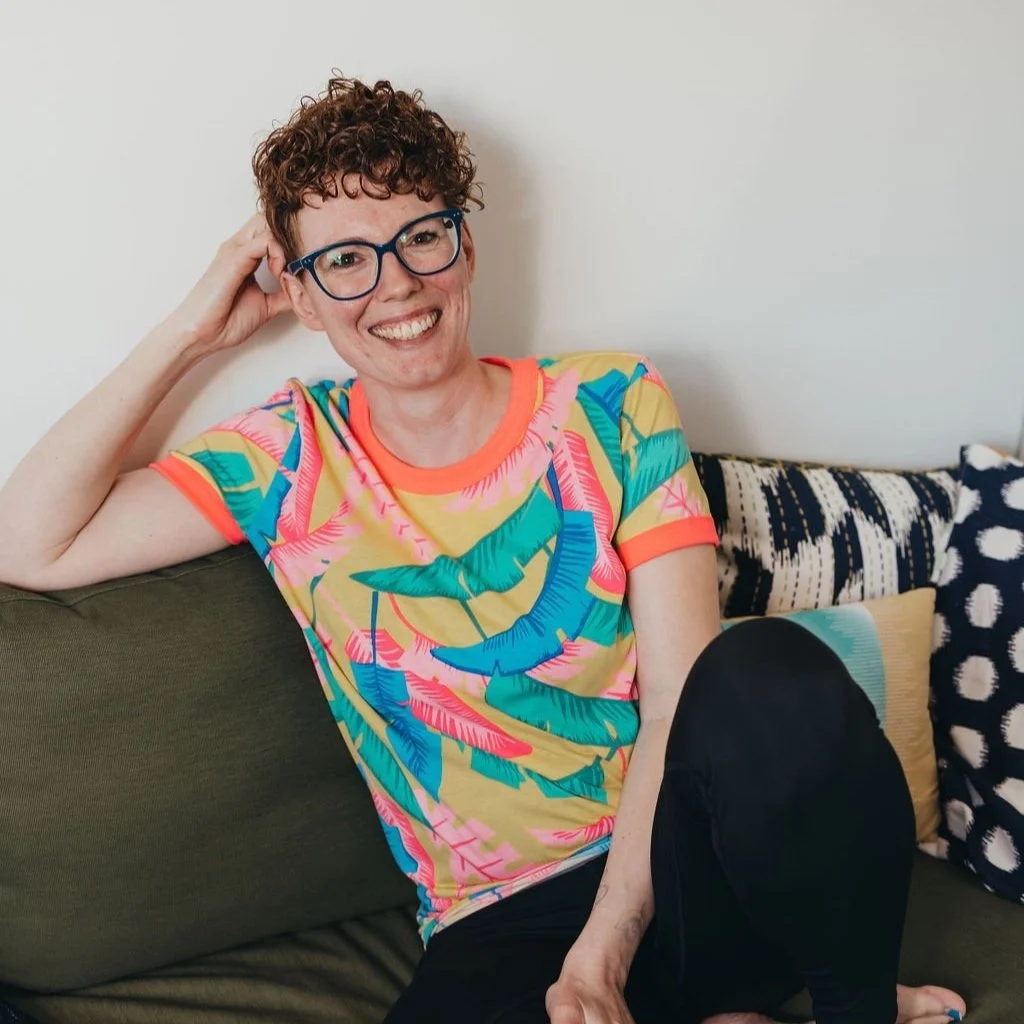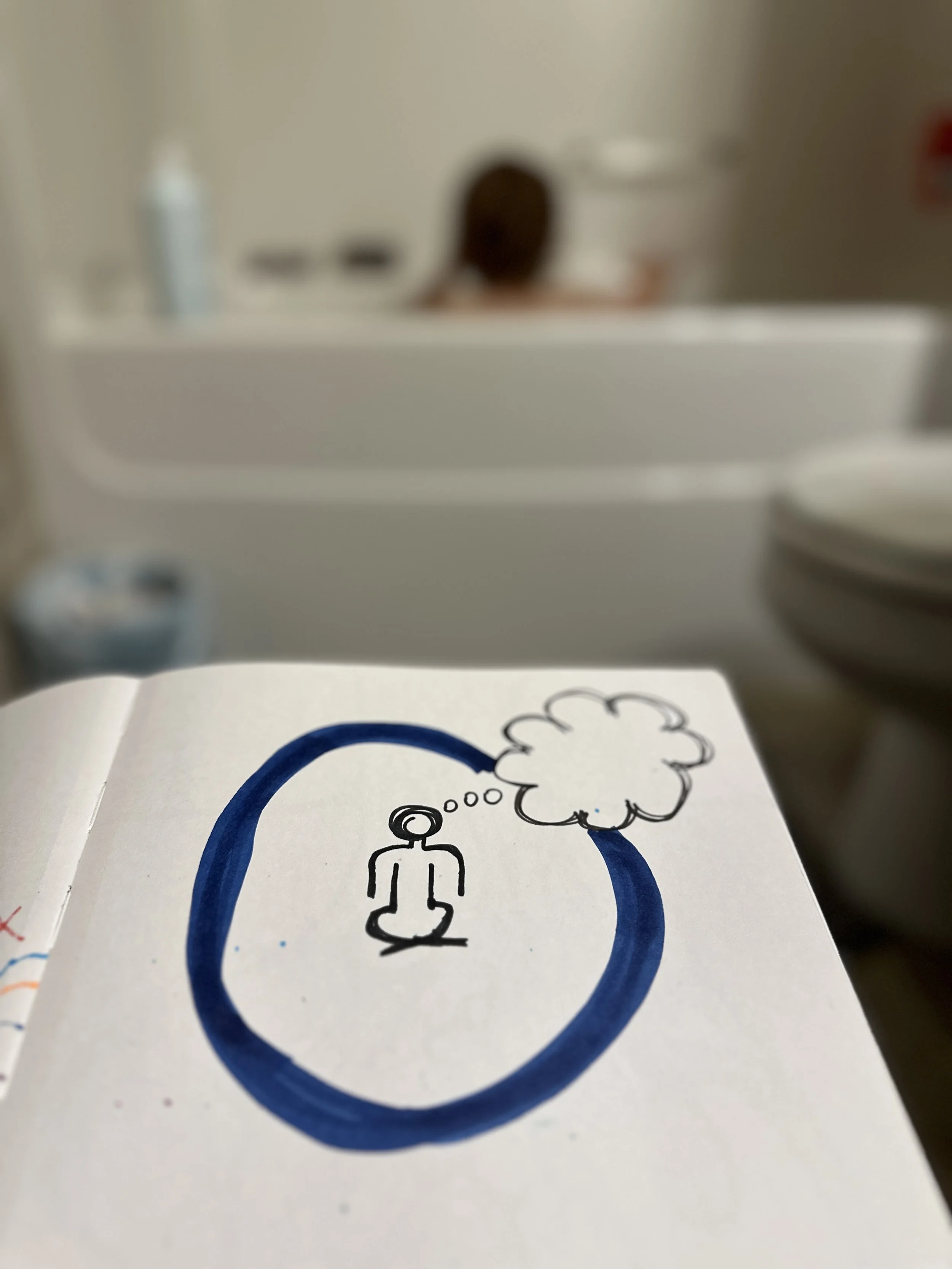The Real Reason Mama is Exhausted: It's Not the Kids, It's the Mental Load
As a mom, you're lying in bed at 1 AM, exhausted but unable to sleep because your overwhelmed mom brain won't stop running through tomorrow's endless to-do list.
School supply list to finish before everything sells out.
Back-to-school forms that somehow multiplied overnight.
New teacher meet-and-greet schedule to coordinate.
Soccer registration deadline you almost missed.
Lunch ideas that your newly picky eater will actually eat.
Backpack name labels that need to be ordered.
After-school care backup plan for early release days.
Figure out what's for dinner when you already spent an hour meal planning around everyone's new schedules.
And that's just Tuesday.
The mental load of motherhood is invisible labor that no one sees, no one counts, and no one appreciates - but it's slowly killing your spirit, your energy, and your sense of self.
If you're reading this at 1 AM with your mind spinning through an endless list of tasks and responsibilities, you're not alone. And more importantly, it's not your fault.
Who I Am and Why This Matters
I'm Kayla Huszar, a Counsellor for Moms (aka, Registered Social Worker and Expressive Arts Therapist) who helps mothers navigate the complexities of modern motherhood.
I work with moms who are drowning in the invisible labor of family life, feeling overwhelmed by the mental load that no one else seems to see or understand.
I know this struggle intimately because I've lived it - and because I come from a long line of women who survived by carrying impossible loads without support, recognition, or relief.
The Inherited Mental Load: Where It All Begins
The mental load isn't something that just appeared with modern motherhood. It's been passed down through generations of women who had no choice but to carry everything.
My grandmother lost her husband when my mom was just fourteen. Suddenly, she was alone with three children to raise (three we knew about at the time, but that's a story for another day).
She didn't choose to be a single mother - life chose it for her, and she did whatever it took to keep her family afloat.
My mom raised me single-handedly, creating her own village when the nuclear family didn't happen.
Sometimes she worked two jobs just to make ends meet. Not because she wanted to prove she was strong or independent, but because there was literally no other option.
These women didn't sacrifice themselves by choice—they sacrificed because survival demanded it. They carried impossible loads because someone had to, and there was no one else.
The unspoken lesson I absorbed was this: good mothers do whatever it takes, no matter the cost to themselves. The mental load isn't just expected—it's proof that you're doing motherhood right.
What Exactly Is the Mental Load?
The mental load is the constant cognitive work of managing a household and family. It's not just the physical tasks—it's the thinking, planning, remembering, organizing, and coordinating that happens behind every single thing that gets done.
It's remembering that your child needs new shoes before the next growth spurt.
It's tracking everyone's schedules in your head and coordinating pickup times.
It's knowing that you're out of milk before you open the fridge.
It's logging into summer camp registration at exactly 9 AM because it's cutthroat and spots fill up in minutes.
Eve Rodsky's research identifies this as "Cognitive Conception, Planning and Execution" - the three phases that make every household task actually three tasks in one.
For example, "doing laundry" actually involves:
planning when to do it and what needs washing,
executing the actual washing/drying/folding, and
monitoring when detergent runs low or when clothes need replacing.
Most partners and family members see the physical tasks - doing laundry, making dinner, driving kids places. But they don't see the hours of mental energy that go into planning, organizing, and coordinating all of it.
And this is exactly why you're so pissed off by the "just make me a list" suggestion.
Making the list IS the mental load. You've already done the thinking, the planning, the coordinating.
You've already figured out what needs to be done, when, and how.
Asking you to make a list is asking you to do even more cognitive work so someone else can do the easy part - the actual doing.
Why the Mental Load Falls on Mothers
Society has conditioned us to believe that mothers are naturally better at this cognitive work. But we're not naturally “better” at it. We've been trained for it our entire lives.
From childhood, girls are socialized to be caregivers, to notice when others need something, to put other people's needs before their own. Boys are taught to focus on their own goals and achievements.
According to Rodsky's research, 71% of women report being interrupted during work time for family needs, compared to just 6% of men. We become the "default parent"—the one everyone turns to for answers, decisions, and solutions.
The mental load doesn't just make you tired—it impacts every aspect of your life and wellbeing.
Physical exhaustion: Your body is constantly in low-level stress mode, depleting your energy reserves and affecting your sleep, immunity, and overall health. Rodsky's research shows that women experiencing high mental load report 40% more stress-related health issues.
Cognitive overload: When your brain is always "on," you lose the ability to be present. You're physically there but mentally somewhere else, running through lists and solving problems.
Lost identity: The constant focus on everyone else's needs means you stop paying attention to your own. You forget what you enjoy, what you want, what you need.
Career impact: Fair Play research reveals that the mental load is a major factor in the "motherhood penalty"—women with children earn 71 cents for every dollar earned by fathers, partly because mental load limits their ability to focus on career advancement.
Resentment and burnout: Carrying invisible labor without recognition or relief builds resentment toward your family and feelings of being trapped in your own life.
I inherited this mental load without question and I hit a breaking point
Through pregnancy, postpartum, and those early chaotic years of motherhood, I white-knuckled my way through every challenge.
Grocery shopping with a screaming toddler? Just part of being a mom.
Exhaustion so deep it felt like drowning? Push through it.
Asking for help? That felt like dishonoring the women who came before me - women who didn't have the luxury of choice.
I made time for everything. I remembered the school picture retake day, scheduled the dentist appointments, researched the best summer camps, organized birthday parties, meal planned, kept track of everyone's feelings and needs and schedules.
I made time for all of that shit. But somehow, I couldn't find time for myself.
Then something shifted during COVID. Not in some grand, dramatic moment - but in the most practical way possible.
I started getting my groceries delivered.
The bags would just appear on my doorstep, contactless and simple.
No wrestling a cart through crowded aisles.
No managing a toddler meltdown in the cereal aisle.
No exhausting trip that somehow took twice as long as planned.
And I haven't looked back since.
It didn't feel like rebellion. It just felt like choosing me. Choosing ease when I could. Choosing to spend that hour doing something that actually filled me up instead of draining me completely.
For the first time, I had recognized that I had choices my grandmother and mother never did - and I actually used them.
That simple act of grocery delivery opened my eyes to something important about choice and privilege. But also something infuriating about how we've been conditioned to prioritize everything except ourselves.
Here's what I want you to understand: you are NOT the problem.
The mindless scrolling isn't the problem. Hell, your partner isn't even the problem for not seeing all you do (okay, maybe a little bit of this is the problem).
The problem is the problem.
The problem is that we're expected to carry everything without support, recognition, or relief.
The problem is the expectation that we should be grateful for the chance to sacrifice ourselves in the name of motherhood.
The problem is that we've been taught that taking care of everyone else IS taking care of ourselves.
The women who raised me weren't trying to teach me self-sacrifice as an ideal.
They were surviving. They were showing me how to endure impossible circumstances, how to find strength when there was no other option, how to keep going when everything fell apart.
But they never got to show me what it looked like to simply choose myself—because that choice wasn't available to them.
The difference is everything.
I see this same inherited mental load pattern in the mothers I work with.
They come in carrying the weight of everyone else's needs, believing that anxiety and worry equal love, that suffering proves devotion. They've learned the same survival tactics from the women before them, even when survival is no longer necessary.
But something beautiful happens when they doodle, collage or move their body to music or write words that no one else will ever read. In those moments, they remember that having choices doesn't dishonor those who came before us. It honors them.
They remember that sometimes we do get to choose our reality.
The women who came before us did everything they could with the circumstances they were given. But we get to do something different.
We get to choose ease when it's available. We get to say yes when someone offers help. We get to show our children a different kind of strength—one that includes rest, joy, and recognizing when we have options and actually using them.
7 Practical Steps to Reduce Your Mental Load
Start with awareness: Notice when you're carrying cognitive work that could be shared or eliminated entirely. Keep a mental load journal for a week—you'll be shocked at how much invisible work you do.
Name it out loud: When you're doing invisible labor, make it visible. "I'm researching summer camps," "I'm coordinating soccer schedules," "I'm planning meals for the week."
Delegate ownership, not just tasks: This is the core insight from Fair Play. Instead of asking your partner to "help with laundry," ask them to own laundry completely—from noticing when it needs to be done to buying detergent when you run out to deciding when kids need new clothes. They hold the planning, execution, and monitoring.
Use the "minimum standard of care": Agree on what "good enough" looks like for each task. Your partner's version of clean dishes might look different than yours—and that's okay as long as they meet the agreed-upon standard.
Choose convenience when you can: Grocery delivery, meal kits, online shopping, cleaning services—these aren't luxuries or signs of laziness. They're tools that give you back time and mental energy. As Rodsky says, "Time is the most precious commodity we have."
Practice the pause: Before automatically taking on a new responsibility, ask yourself: "Does this have to be done? Does it have to be done by me? Does it have to be done now?"
Build your village: Accept help when it's offered. Ask for specific support from friends and family. Consider paid help if it's within your budget.
You Don't Need to (and Frankly Shouldn’t) Optimize Your Way Out of This
You don't need to optimize your way into worthiness.
You don't need to hack your way into happiness.
You don't need to hustle your way into enough-ness.
You get to be enough because you exist. Full stop.
The mental load isn't a problem to be solved with better time management or more productivity tips. It's a systemic issue that requires systemic change—in your household, in your community, and in society.
But it starts with you recognizing that you don't have to carry everything alone.
The wild thing is, when we stop making struggle our proof of love and start recognizing our privilege to choose differently, everything shifts. Our kids see a mother who makes thoughtful choices rather than constant sacrifices. Our partners see someone who honors both strength and softness. We see that we can carry the resilience of those who came before us without carrying their burdens.
That grocery delivery became what it actually was: a mother recognizing that she had choices her grandmother never did, and honoring that privilege by using it wisely.
You don't need to suffer your way into worthiness. The women before you already paid that price.
Your exhaustion isn't proof that you're a good mother.
Your overwhelm isn't evidence of your dedication.
Your mental load isn't a badge of honor - it's a burden that was never meant to be carried alone.
You deserve support. You deserve rest.
You deserve to choose ease when it's available to you.
The weight of the mental load might be killing you, and it's not your fault. But healing from it? That gets to be your choice.
I'd love to hear from you:
What part of your mental load feels the heaviest right now?
What would it feel like to put that burden down, even just for a day?
Share in the comments - sometimes just naming it out loud is the first step toward freedom.
If you're ready to explore what putting down the mental load looks like:
Join The Motherload Membership → A space to rest, create, and remember who you are beyond the endless lists ($25-75 sliding scale)
Book a one-on-one session → Let's create space for you to remember you matter too
Your worth isn't measured by what you carry,
Kayla
P.S. I still think about my grandmother sometimes when I hear that delivery truck pull up. She was suddenly alone with three children after losing her husband, working at a time when that wasn't typical for women, doing whatever it took to survive. She never had the luxury of choosing ease over struggle. But I know she's relieved to know that her granddaughter gets to make choices she never could. That her survival makes my thriving possible.
Ready to dive deeper into what authentic parenting looks like for YOUR family? Book a session with me and we'll figure out how you can parent without all the scripts and overthinking.
Disclaimer: This site contains some affiliate links. I get a little moola in exchange for creating this content and you get cool book and product recommendations at no extra cost to you!
This information is for educational purposes only. Kayla cannot provide personalized advice or recommendations for your unique situation or circumstances. Therefore, nothing on this page or website should replace therapeutic recommendations or personalized advice. If you require such services, please consult with a medical or therapeutic provider to determine what's best for you. Kayla cannot be held responsible for your use of this website or its contents. Please never disregard or delay seeking medical or therapeutic treatment because of something you read or accessed through this website.
© 2025 Kayla Huszar - All Rights Reserved.







